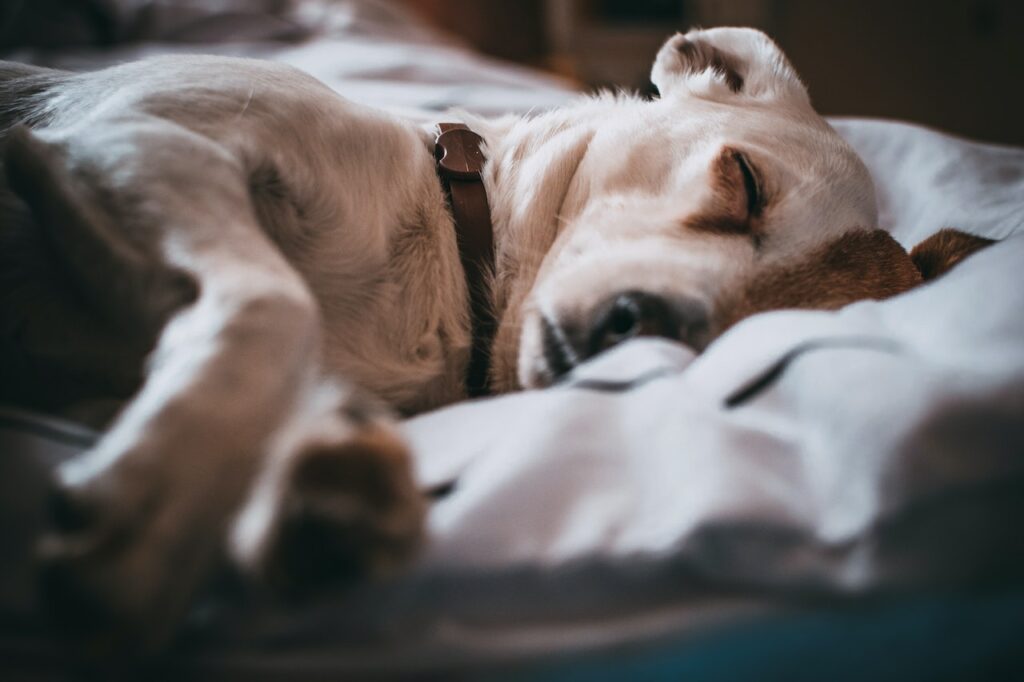Do Dogs Sweat When They Sleep? Here’s What You Should Know
Have you ever noticed your pup dozing off in the middle of a hot summer day and wondered if they were getting too warm? If so, you’re not alone. One of the most common questions about dogs is whether or not they sweat when they sleep. The answer may surprise you! This article will explore how dogs regulate their body temperature, how they do and do not sweat, and what other methods they use to help cool themselves down. We’ll also discuss the signs you should look for in your dog to ensure that he or she stays cool while sleeping. So read on to learn more about why dogs sweat when they sleep – it could be important information for keeping your pooch healthy and comfortable!
What Is Sweating?
Sweating is an important way humans and other animals regulate their body temperature. Sweat glands are located across the entire body and release a liquid composed of water, electrolytes, proteins, and fatty acids onto the surface of our skin. This liquid’s evaporation helps cool us off when our bodies become too warm.
How Do Dogs Perspire?
Unlike humans, dogs do not have sweat glands on their skin that can release liquid onto their outer layer. Instead, they have specialized glands localized around their paws which produce a small amount of moisture to help them escape from hot surfaces or aid in friction against hard surfaces like concrete or tile. These glands are referred to as sudoriferous glands or sweat pads and are much less effective at cooling down an overheated pup than human sweat glands are for people.
Do Dogs Sweat When They Sleep?
Dogs don’t sweat when they sleep because they lack sufficient sweat glands on their fur-covered skin. That being said, while they may not be able to use sweating as a way to lower their internal temperature during sleep, there are still several methods that canines may use to stay comfortable while dozing:
Body Posture
Dogs may adjust their body posture during sleep to control how much heat is absorbed into or released away from their bodies. For instance, positioning themselves so that there is more contact with cooler objects (such as shaded grass or carpet) can help reduce how much warmth accumulates within them as they slumber away.
Panting
Panting is common for dogs to quickly and efficiently lower their internal temperature after an intense activity or when it’s really hot out. Although panting does not provide cooling relief during sleep because it does not result in evaporative cooling like sweating does for humans, it can help reduce how much heat builds up through shallow breathing instead of deep breaths.
Non-Evaporative Cooling Methods
Pooches employ several non-evaporative cooling methods, such as licking their fur coat or lying down on top of cool surfaces such as grasses or dirt patches outside so that some of the excess heat dissipates away from them and helps maintain a normal body temperature throughout the day and night.
List of Benefits of Non-Evaporative Cooling Methods:
- Quicker recovery times after an active event.
- Reduced risk of developing heat stroke due to excessive temperatures during summertime months.
- Ability to conserve energy which would otherwise be spent trying to cool themselves by panting excessively.
List of Drawbacks of Non-Evaporative Cooling Methods:
- Not enough cooling potential compared with evaporative methods (i.e., sweating) used by humans
- Potentially uncomfortable for pooches due to increased contact with cold surfaces/materials (i.e., grasses/dirt patches)
Conclusion
In conclusion, although dogs cannot use sweating as a way to cool themselves down while sleeping like humans do because they lack sufficient sweat glands on their fur-covered skins; however, there are still plenty of other methods available such as altering body posture accordingly while sleeping along with employing various non-evaporative cooling techniques such as licking fur coats or resting on cold surfaces outside which can help ensure good health and comfort throughout long periods without adequate ventilation sources nearby.
If you’re worried about your four-legged friend staying cool and comfortable during the hot summer months, consider getting them insured with Furrr.co.uk! Our pet insurance plans cover medical expenses related to heat stroke or other injuries related to overheating, so you can rest assured that your pup is always taken care of in case an emergency arises. With easy online enrollment and customizable policy options, get started on protecting your furry family member today!










